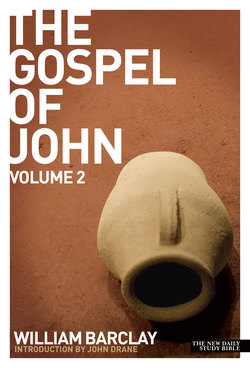Читать книгу New Daily Study Bible: The Gospel of John vol. 2 - William Barclay - Страница 30
На сайте Литреса книга снята с продажи.
ОглавлениеPREJUDICE AND CONVICTION
John 9:13–16
They brought him, the man who had been blind, to the Pharisees. The day on which Jesus had made the clay and opened his eyes was the Sabbath day. So the Pharisees asked him again how sight had come to him. He said to them: ‘He put clay on my eyes; and I washed; and now I can see.’ So some of the Pharisees said: ‘This man is not from God, because he does not observe the Sabbath.’ But others said: ‘How can a man who is a sinner perform such signs?’ And there was a division of opinion among them. So they said to the blind man: ‘What is your opinion about him, in view of the fact that he opened your eyes?’ He said: ‘He is a prophet.’
NOW comes the inevitable trouble. It was the Sabbath day on which Jesus had made the clay and healed the man. Undoubtedly Jesus had broken the Sabbath law, as the scribes had worked it out, and done so in fact in three different ways.
(1) By making clay, he had been guilty of working on the Sabbath, when even the simplest acts constituted work. Here are some of the things which were forbidden on the Sabbath. ‘A man may not fill a dish with oil and put it beside a lamp and put the end of the wick in it.’ ‘If a man extinguishes a lamp on the Sabbath to spare the lamp or the oil or the wick, he is culpable.’ ‘A man may not go out on the Sabbath with sandals shod with nails.’ (The weight of the nails would have constituted a burden, and to carry a burden was to break the Sabbath.) A man might not cut his fingernails or pull out a hair of his head or his beard. Obviously, in the eyes of such a law, to make clay was to work and so to break the Sabbath.
(2) It was forbidden to heal on the Sabbath. Medical attention could be given only if life was in actual danger. Even then, it must be only such as to keep patients from getting worse, not to make them any better. For instance, it was not permitted for anyone with toothache to suck vinegar through the teeth. It was forbidden to set a broken limb. ‘If a man’s hand or foot is dislocated he may not pour cold water over it.’ Clearly the man who was born blind was in no danger of his life; therefore Jesus broke the Sabbath when he healed him.
(3) It was quite definitely laid down: ‘As to fasting spittle, it is not lawful to put it so much as upon the eyelids.’
The Pharisees are typical of the people in every generation who condemn anyone whose idea of religion is not theirs. They thought that theirs was the only way of serving God. But some of them thought otherwise and declared that no one who did the things Jesus did could be a sinner.
They brought the man and examined him. When he was asked his opinion of Jesus, he gave it without hesitation. He said that Jesus was a prophet. In the Old Testament, a prophet was often tested by the signs he could produce. Moses guaranteed to Pharaoh that he really was God’s messenger by the signs and wonders which he performed (Exodus 4:1–17). Elijah proved that he was the prophet of the real God by doing things the prophets of Baal could not do (1 Kings 18). No doubt the man’s thoughts were running on these things when he said that in his opinion Jesus was a prophet.
Whatever else, this was a brave man. He knew quite well what the Pharisees thought of Jesus. He knew quite well that if he came out on Jesus’ side he was certain to be excommunicated. But he made his statement and took his stand. It was as if he said: ‘I am bound to believe in him, I am bound to stand by him because of all that he has done for me.’ Therein he is our great example.
